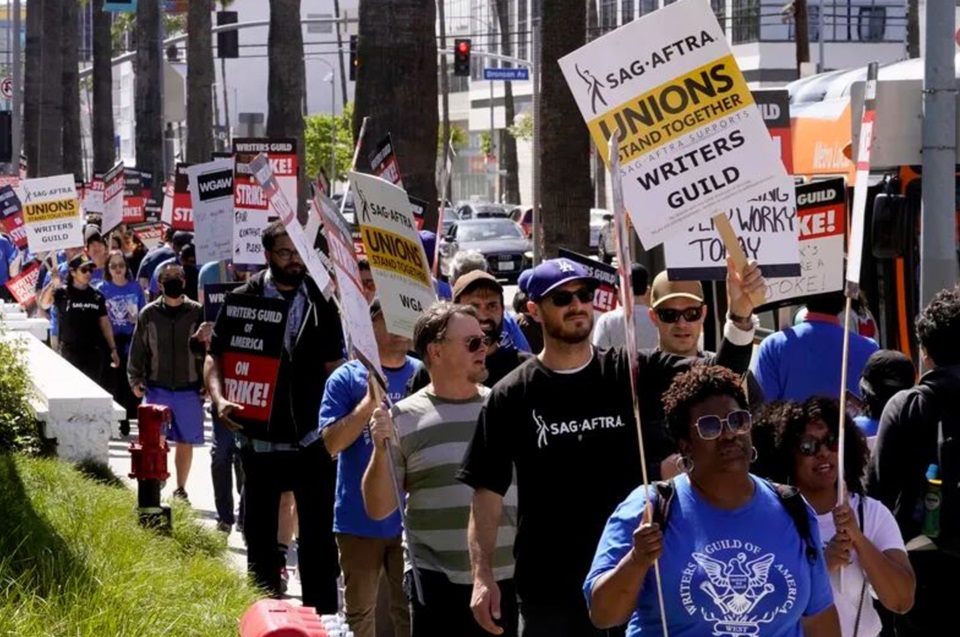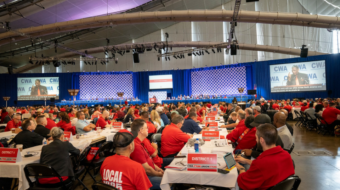
HOLLYWOOD AND NEW YORK -The SAG-AFTRA strike of 160,000 performers against major Hollywood studios, Netflix and similar streaming video producers, Broadway stages, TV networks and their ilk, is over. The two sides agreed on a tentative three-year contract, subject to ratification, and the 118-day walkout ended at 12:01 am Pacific Time on November 9.
The news came in an exultant Instagram posting from SAG-AFTRA President Fran Drescher, the noted comic actress who became the face of the union during the struggle.
“We did it!!!! The Billion+ $ Deal! 3X the last contract! New ground was broken everywhere! Ty [thank you] SAG AFTRA members for hanging in and holding out for this historic deal! Ty neg comm [negotiating committee], strike captains, staff, Duncan & Ray, our lawyers, the IA team, family and friends. Our sister unions for their unrelenting support! And the AMPTP for hearing us and meeting this moment! #sagaftrastrong”
Other than Drescher’s posting, few details of the settlement were available, except for what trade papers called significant raises for the performers. Variety put the raise in minimum salaries at 7%, but didn’t say if that’s yearly or not. Details will be released, SAG-AFTRA said, after its board votes on the tentative pact on November 10.
Talks were desultory, at best, in the weeks of the strike, until the heads of the major studios, such as Disney’s Bob Iger and Netflix’s Ted Sarandos, became personally involved in the final days. For much of the same time, the Writers Guild of America and WGA-East, representing writers for Hollywood and for the stage, were also on strike.
“We didn’t just come toward you, we came all the way to you,” Sarandos told SAG-AFTRA leaders before the union began digging into the fine print of what the bosses termed their last, best and final offer.
The joint strikes of WGA and SAG-AFTRA shut down both Hollywood and Broadway for extended times for the first time since 1960. The public sided with the performers and the writers, once it learned how little the overwhelming majority of those groups earned.
Indeed, they earned so little that unless SAG-AFTRA members earned at least $26,000 yearly—and most don’t—they weren’t even eligible to buy company provided health insurance.
The AMPTP (Alliance of Motion Picture and Theatre Producers) which represented the studios and other bosses, almost didn’t “meet the moment.” Bargaining hit a last-weekend snag over the issue that was the top gulf between the performers and the producers: Artificial intelligence.
All through the strike, the AMPTP members schemed to invest heavily in AI as a way to drastically cut costs. In plain English, use of computerized AI would let a studio film a performer’s face, voice and actions for one day, archive that, pay the performer for that day’s work, and then use it forever—without paying one red cent more for repeated reuse.
AI, plus cuts in residuals as a result of such platforms as streaming video, and the studios’ determination to use smaller crews for shorter hours for each film or show, led to the strike.
“The tentative contract is expected to boost minimum pay, increase residual payments for streaming projects, strengthen rules around self-taped auditions, and better fund the union’s health and pension plans. Crucially, it also includes concessions on artificial intelligence,” one trade paper, The Daily Beast, reported.
We hope you appreciated this article. At People’s World, we believe news and information should be free and accessible to all, but we need your help. Our journalism is free of corporate influence and paywalls because we are totally reader-supported. Only you, our readers and supporters, make this possible. If you enjoy reading People’s World and the stories we bring you, please support our work by donating or becoming a monthly sustainer today. Thank you!










